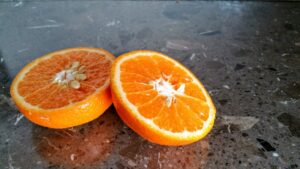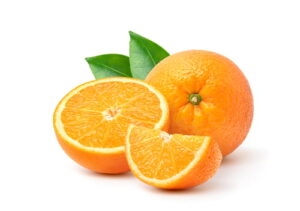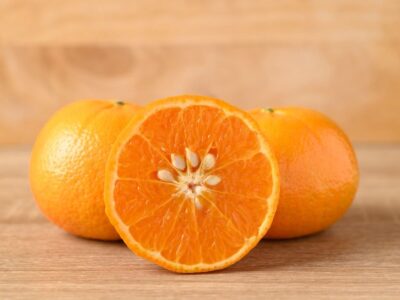When it comes to caring for our scaly friends, there’s no shortage of questions about their diet. One query that often pops up is: can bearded dragons eat oranges? It’s a valid concern because, as responsible keepers, we want to make sure our beardies get the best nutrition possible.
So, bearded dragons can eat oranges occasionally, but they shouldn’t be a regular part of their diet. While oranges are rich in vitamin C, they also contain high levels of citric acid and natural sugars, which can be harmful to your bearded dragon if consumed in excess.
It’s best to offer oranges as an occasional treat rather than a staple food. Make sure to remove any seeds and peel the orange before feeding it to your bearded dragon, and always monitor their reaction to new foods.
Macronutrients required by bearded dragons

Bearded dragons require a balanced diet that includes specific macronutrients to thrive. Here are the primary macronutrients needed by bearded dragons:
- Protein: Bearded dragons are omnivores, meaning they require both animal and plant-based protein sources. Insects such as crickets, mealworms, dubia roaches, and superworms are essential sources of protein for juvenile and adult bearded dragons. As they mature, their protein intake should be gradually reduced, and they should be offered more plant-based protein sources like dark leafy greens and vegetables.
- Fiber: Fiber is essential for proper digestion and gut health in bearded dragons. Dark leafy greens such as collard greens, mustard greens, dandelion greens, and kale are excellent sources of fiber. Vegetables like squash, bell peppers, and carrots also contribute to their fiber intake.
- Fat: Bearded dragons require moderate amounts of healthy fats for energy and nutrient absorption. Insects like dubia roaches and superworms are good sources of fat, as well as occasional treats like waxworms. However, it’s essential to monitor their fat intake and avoid feeding them high-fat insects too frequently.
- Calcium and Phosphorus: Calcium and phosphorus are crucial for bone health and proper growth in bearded dragons. Calcium is particularly important for preventing metabolic bone disease. Bearded dragons require a calcium-to-phosphorus ratio of about 2:1 in their diet. Calcium supplements, dusted onto their food, are often necessary to ensure they receive enough calcium. Additionally, providing a variety of calcium-rich foods such as dark leafy greens, broccoli, and calcium-rich insects like dubia roaches is essential.
- Water: While not a macronutrient, water is vital for hydration and overall health in bearded dragons. Ensure your pet has access to fresh, clean water at all times. Some bearded dragons may prefer to drink from a shallow dish, while others may prefer to get their moisture from the food they eat. Monitor their water intake and provide additional hydration if necessary, especially during hot weather or when they are shedding.
By providing a balanced diet that includes the right mix of protein, fiber, fat, calcium, phosphorus, and water, you can help ensure that your bearded dragon stays healthy and thriving.
Can Bearded Dragons Eat Oranges?
Bearded dragons can eat oranges occasionally, but they should not be a significant part of their regular diet. Oranges are high in natural sugars and citric acid, which can be potentially harmful to bearded dragons if consumed in excess. However, offering small amounts of orange as an occasional treat can provide some variety to their diet and offer them a source of vitamin C.
When feeding oranges to your bearded dragon, it’s essential to remove any seeds and peel the fruit to prevent choking or digestive issues. Additionally, observe your pet’s reaction to the orange, as some bearded dragons may not enjoy the taste or may have adverse reactions to citrus fruits.
As with any new food, introduce oranges gradually and in moderation to gauge how your bearded dragon responds. Overall, while oranges can be included in their diet occasionally, it’s crucial to prioritize a balanced and varied diet consisting primarily of appropriate vegetables, fruits, and insects.
Factors to consider before feeding oranges to bearded dragons

Before feeding oranges to your bearded dragon, there are several important factors to consider:
- Nutritional Balance: Bearded dragons require a balanced diet that includes a variety of vegetables, fruits, and insects. While oranges can provide vitamin C, they are high in natural sugars and citric acid. Ensure that oranges are offered only occasionally and in moderation to maintain a balanced diet.
- Digestive Health: Citrus fruits like oranges contain citric acid, which can potentially upset the digestive system of bearded dragons, leading to issues like diarrhea or gastrointestinal discomfort. Monitor your bearded dragon’s reaction when introducing oranges and be cautious of any adverse digestive effects.
- Sugar Content: Oranges are relatively high in natural sugars. Excessive consumption of sugary foods can lead to obesity and other health issues in bearded dragons. Limit the amount of orange offered to avoid overloading your pet with sugars.
- Seed and Peel Removal: Always remove any seeds and peel from the oranges before feeding them to your bearded dragon. Seeds can pose a choking hazard, and the peel may contain pesticides or other harmful substances.
- Preference and Individual Tolerance: Like humans, bearded dragons have individual preferences and tolerances for different foods. Some may enjoy the taste of oranges, while others may not. Observe your bearded dragon’s reaction to oranges and adjust their diet accordingly based on their preferences and any signs of discomfort.
- Variety in Diet: While oranges can be offered as an occasional treat, they should not replace essential components of a bearded dragon’s diet, such as insects and leafy greens. Ensure a varied diet to meet all of your pet’s nutritional needs.
By considering these factors and offering oranges responsibly as an occasional treat, you can ensure the health and well-being of your bearded dragon. Always consult with a reptile veterinarian if you have any concerns about your pet’s diet or health.
Health Benefits of Oranges for Bearded Dragons
While oranges should only be fed to bearded dragons occasionally and in moderation due to their high sugar content and acidity, they do offer some potential health benefits when provided responsibly:
- Vitamin C: Oranges are rich in vitamin C, which is essential for the overall health and immune function of bearded dragons. A small amount of orange can help boost their vitamin C intake, especially if they have limited access to other sources of this nutrient in their diet.
- Hydration: Oranges contain water, which can contribute to your bearded dragon’s hydration levels, particularly if they are not consuming enough water from other sources. Proper hydration is crucial for the overall health and well-being of reptiles.
- Variety in Diet: Offering oranges as an occasional treat can provide variety in your bearded dragon’s diet, which may help stimulate their appetite and prevent dietary boredom. Introducing new foods can also encourage natural foraging behaviors.
- Natural Sugars for Energy: While high in natural sugars, the sugars found in oranges can provide a quick energy boost for bearded dragons. This can be beneficial, particularly for younger dragons that are growing rapidly and have higher energy requirements.
- Enrichment: Providing oranges as an occasional treat can offer mental stimulation and enrichment for your bearded dragon. It allows them to experience different tastes, textures, and smells, which can contribute to their overall well-being.
It’s important you know that while oranges can offer these potential benefits, they should only be a small part of your bearded dragon’s diet and should never replace essential components such as insects and leafy greens.
You need to always feed oranges in moderation, remove any seeds and peel, and monitor your bearded dragon’s reaction for any signs of digestive upset or other adverse effects. If you have any concerns about your pet’s diet or health, consult with a reptile veterinarian for guidance.
Risks and Concerns

While oranges can offer some health benefits to bearded dragons when fed in moderation, there are also risks and concerns associated with including them in their diet:
- High Sugar Content: Oranges are relatively high in natural sugars, which can lead to obesity and other health issues if consumed in excess. Bearded dragons have specific dietary requirements, and too much sugar can disrupt their metabolic balance and lead to weight gain.
- Citric Acid: Oranges contain citric acid, which can be harsh on the digestive system of bearded dragons, particularly if they have sensitive stomachs. Citric acid can cause digestive upset, diarrhea, and gastrointestinal discomfort in some individuals.
- Calcium-Phosphorus Imbalance: Oranges have a calcium-phosphorus ratio that is not ideal for bearded dragons. While they contain some calcium, they also have a relatively high phosphorus content, which can interfere with calcium absorption and lead to metabolic bone disease if fed excessively.
- Potential Choking Hazard: The seeds and peel of oranges can pose a choking hazard for bearded dragons if ingested. It’s essential to remove all seeds and peel before offering oranges to your pet to prevent choking or digestive issues.
- Allergic Reactions: Some bearded dragons may be allergic to oranges or may have adverse reactions to the citrus fruit. Signs of an allergic reaction can include itching, swelling, hives, or difficulty breathing. If you notice any of these symptoms after feeding oranges, discontinue the fruit and consult with a reptile veterinarian.
- Nutritional Imbalance: While oranges provide some vitamins and minerals, they do not offer a complete and balanced diet for bearded dragons. Feeding oranges too frequently or in large quantities can lead to nutritional imbalances and deficiencies, as they may not be getting all the essential nutrients they need from other sources.
- Dietary Displacement: Offering oranges as a treat may displace other, more nutritious foods in the bearded dragon’s diet, leading to deficiencies in essential nutrients. It’s essential to prioritize staple foods such as insects, leafy greens, and vegetables over occasional treats like oranges.
Overall, while oranges can be offered as an occasional treat to bearded dragons, it’s crucial to do so in moderation and with careful consideration of the risks and concerns outlined above. Always monitor your bearded dragon’s health and well-being and consult with a reptile veterinarian if you have any concerns about their diet or any adverse reactions to specific foods.
How to Feed Oranges to Bearded Dragons Safely
Feeding oranges to bearded dragons safely involves several steps to minimize risks and ensure that they can enjoy this occasional treat without adverse effects:
- Choose Ripe Oranges: Select ripe oranges that are fresh and free from mold or signs of spoilage. Avoid oranges that are overly soft or have dark spots.
- Wash Thoroughly: Before feeding oranges to your bearded dragon, wash them thoroughly under running water to remove any dirt, pesticides, or other contaminants that may be present on the surface.
- Remove Seeds and Peel: Carefully remove all seeds and peel from the oranges before offering them to your bearded dragon. Seeds can pose a choking hazard, and the peel may contain pesticides or other harmful substances.
- Cut into Small Pieces: Cut the orange flesh into small, bite-sized pieces that are easy for your bearded dragon to consume. This helps prevent choking and makes it easier for them to digest.
- Offer in Moderation: Oranges should only be offered to bearded dragons occasionally and in moderation. Limit the amount to a small portion, such as a few small pieces, and avoid feeding oranges too frequently.
- Monitor Reaction: After feeding oranges to your bearded dragon for the first time, closely monitor their reaction for any signs of digestive upset, allergic reactions, or other adverse effects. If they show any signs of discomfort or illness, discontinue feeding oranges and consult with a reptile veterinarian.
- Balance with Other Foods: Oranges should not replace essential components of the bearded dragon’s diet, such as insects, leafy greens, and vegetables. Ensure that oranges are offered as a supplement to a balanced diet rather than a staple food.
- Provide Fresh Water: Always provide fresh, clean water for your bearded dragon to drink. Offering water alongside oranges can help prevent dehydration and aid in digestion.
By following these guidelines, you can safely offer oranges to your bearded dragon as an occasional treat while minimizing the risk of digestive issues or other health problems. As with any new food, it’s essential to introduce oranges gradually and monitor your pet’s reaction to ensure their well-being.
Signs of an adverse reaction and what to do
Signs of an adverse reaction in a bearded dragon after consuming oranges or any other food can vary, but common symptoms to watch for include:
- Digestive Upset: This may manifest as diarrhea, vomiting, or changes in stool consistency or frequency. Bearded dragons may also show signs of discomfort, such as abdominal swelling or restlessness.
- Lethargy: A noticeable decrease in activity level or overall energy may indicate that your bearded dragon is not feeling well. They may appear sluggish, uninterested in their surroundings, or reluctant to move.
- Loss of Appetite: If your bearded dragon refuses to eat or shows a decreased interest in food after consuming oranges, it could be a sign of digestive discomfort or an adverse reaction to the fruit.
- Abnormal Behavior: Look for any unusual behaviors or movements, such as twitching, spasms, or seizures. These can be signs of neurological issues or toxicity.
- Respiratory Distress: Labored breathing, wheezing, or gasping for air may indicate respiratory problems, which could be caused by an allergic reaction or irritation from ingesting oranges.
- Skin Irritation: Allergic reactions can sometimes manifest as skin irritation, such as redness, swelling, or itching. You may notice your bearded dragon scratching or rubbing against objects more than usual.
If you observe any of these signs or symptoms in your bearded dragon after feeding them oranges, take the following steps:
- Discontinue Feeding Oranges: Stop offering oranges immediately and remove any remaining fruit from your bearded dragon’s enclosure.
- Monitor Closely: Keep a close eye on your bearded dragon’s condition and behavior. Note any changes or worsening of symptoms.
- Offer Water: Provide fresh, clean water for your bearded dragon to drink. Hydration is essential, especially if they are experiencing digestive upset.
- Seek Veterinary Care: If your bearded dragon shows severe or persistent symptoms, or if you are unsure about the cause of their reaction, consult with a reptile veterinarian as soon as possible. They can provide guidance and appropriate treatment to address your pet’s needs.
It’s essential to act promptly if you suspect that your bearded dragon is having an adverse reaction to oranges or any other food. Early intervention can help prevent further complications and ensure the best possible outcome for your pet.
Conclusion
While bearded dragons can eat oranges, it’s essential to do so cautiously and in moderation. Oranges can offer some health benefits, such as providing vitamin C and hydration, but they also come with risks, including high sugar content and citric acid levels. To feed oranges safely, remove seeds and peel, offer small portions occasionally, and monitor your bearded dragon for any adverse reactions.
Prioritizing a balanced diet of insects, leafy greens, and vegetables remains crucial for their overall health and well-being. So, can bearded dragons eat oranges? Yes, but with careful consideration and as an occasional treat rather than a dietary staple.

